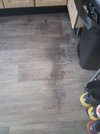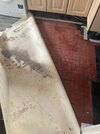The kitchen in my mothers 1980's bungalow was extended about 20 years ago. The original floor is bitumen with red bitumen floor tiles, the extension floor is concrete. They have had a carpet fitted over thin underlay for many years which we had removed earlier this year when the house was decorated.
I thought Vinyl would be more manageable so we got a carpet fitter to pull up the old nasty carpet & underlay and replace with Vinyl.
Now, some 3 months later there are black stains coming up through the Vinyl. The area stained most is where people have stood while they are working by the worktops, preparing food etc. So maybe standing on the bitumen regularly in the same are has caused it to weep and leach up ?
I've pulled back the vinyl and it looks a bit damp under it although it's definitely not water as it's bone dry behind all the kick boards. It looks to me that the bitumen has leached through the vinyl in places and of course the vinyl is now ruined.
Before I replace the vinyl with new, can I have recomendations how to seal the floor so it doesn't leach through again ?
My first thought would be to put thin ply down but screwing it down into brittle bitumen may not be easy. Another option suggested was to put a thin plastic membrane over the bitumen floor under the vinyl, leave the current vinyl down, put another thin plastic sheet over that and then lay the new vinyl on top, thus using the plastic sheets to seal the bitumen floor. Would this cause the bitumen to sweat though ?
Or would I be better sealing the floor with ??? and then screed over it and lay the new vinyl on top. If so what products whould I need to use to seal and screed it ?
Any recomendations please ?
thanks
I thought Vinyl would be more manageable so we got a carpet fitter to pull up the old nasty carpet & underlay and replace with Vinyl.
Now, some 3 months later there are black stains coming up through the Vinyl. The area stained most is where people have stood while they are working by the worktops, preparing food etc. So maybe standing on the bitumen regularly in the same are has caused it to weep and leach up ?
I've pulled back the vinyl and it looks a bit damp under it although it's definitely not water as it's bone dry behind all the kick boards. It looks to me that the bitumen has leached through the vinyl in places and of course the vinyl is now ruined.
Before I replace the vinyl with new, can I have recomendations how to seal the floor so it doesn't leach through again ?
My first thought would be to put thin ply down but screwing it down into brittle bitumen may not be easy. Another option suggested was to put a thin plastic membrane over the bitumen floor under the vinyl, leave the current vinyl down, put another thin plastic sheet over that and then lay the new vinyl on top, thus using the plastic sheets to seal the bitumen floor. Would this cause the bitumen to sweat though ?
Or would I be better sealing the floor with ??? and then screed over it and lay the new vinyl on top. If so what products whould I need to use to seal and screed it ?
Any recomendations please ?
thanks



